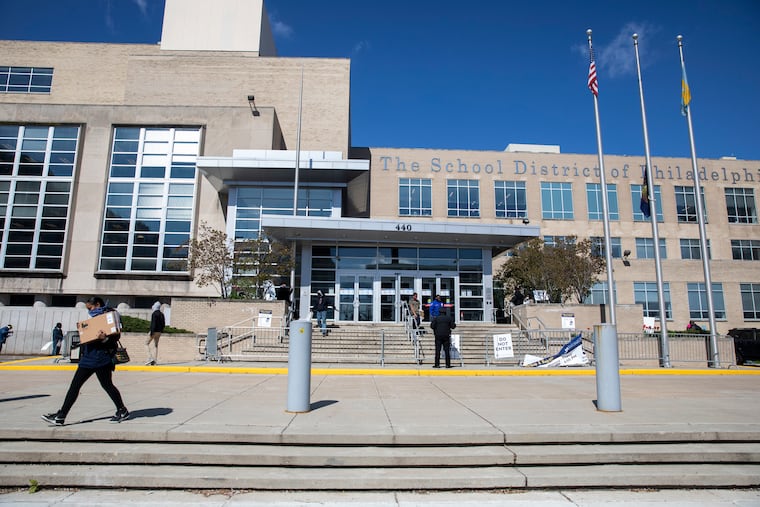Philly families worry classrooms won’t be safe for students | Coronavirus Newsletter
Plus, why a blood plasma study is not as definitive as it seems

TL;DR: As many as 32,000 Philadelphia students are expected to return to school two days a week starting at the end of November, but this week Superintendent William R. Hite Jr. raised the possibility of delaying the return date, citing rising coronavirus cases. Still, Philly teachers and parents wonder if kids do return, will classrooms be ready? An editorial accompanying a trial published last week declared blood plasma ineffective for COVID-19, but a Temple University researcher isn’t giving up. Here’s why.
— Ellie Silverman (@esilverman11, health@inquirer.com)
What you need to know:
📈 Pennsylvania is now averaging more than 2,000 new cases a day and rising, the highest at any point during the pandemic. While cases continue to surge, the death rate in both Pennsylvania and New Jersey continues to fall.
😫 The biggest driver of new cases in New Jersey? Fatigue, according to Gov. Phil Murphy.
✈️ Pennsylvania is not considering another shutdown, but health officials urge residents not to celebrate holidays with anyone outside their household. But if you are a college student traveling home for Thanksgiving, you should get tested, a college health association says.
❌ U.S. Attorney William McSwain’s office is filing a “letter of interest” in support of a lawsuit aimed at removing a ban in Philadelphia on large events and parades.
🏠 A CDC study determined that household spread of COVID-19 is very common.
🚇 SEPTA is indefinitely cutting overnight Market-Frankford, Broad Street Line weekend subway service due to COVID-19.
💰 President Donald Trump threatened to withhold aid from Pennsylvania as the coronavirus surges. Here’s what you need to know.
📰 What’s going on in your county or neighborhood? We organized recent coverage of the coronavirus pandemic by local counties and Philly neighborhoods mentioned in the stories to make it easier for you to find the info you care about.
Local coronavirus cases
📈The coronavirus has swept across the Philadelphia region and cases continue to mount. The Inquirer and Spotlight PA are compiling geographic data on tests conducted, cases confirmed, and deaths caused by the virus. Track the spread here.
As many as 32,000 Philadelphia students are expected to return to school two days a week starting the end of November, but Superintendent William R. Hite Jr. this week raised the possibility of delaying the return date, citing rising local coronavirus cases. Still, Philly teachers and parents wonder if kids do return, will classrooms be ready? They are “skeptical of the school system’s track record, lacking full information to make decisions, wary of other schools' data that shows inadequate ventilation in many schools, and ‘really troubled’ at the prospect of sending children and teachers into the unknown in a pandemic,” my colleague Kristen A. Graham reports. Read more here.
A trial published last week that showed COVID-19 patients who were given plasma cleared the coronavirus more quickly than a comparison group, however there was no difference in progression to severe disease or death. “Convalescent plasma is ineffective for COVID-19,” read the title of an accompanying editorial. But, a Temple University clinical pathologist and director of transfusion medicine says that conclusion is premature. Here’s why.
Helpful resources
These 8 principles of social distancing can help you figure out what you can and can’t do.
If you’ve hit a COVID-19 wall, here are ways to cope.
The coronavirus is mainly transmitted through the air. Here’s how to tell if your ventilation is OK.
How does the virus affect your entire body?
Here’s what to know about traveling safely during the pandemic.
You got this: How long can you safely be around someone with the coronavirus?
You may be wondering how long it takes to get the coronavirus from someone who is infected. Is it an hour? 15 minutes? Experts say there is no magic number of minutes. Read more advice here on how to limit your risk.
🍽️ Plastic panels and dining nooks? Restaurateurs are making changes to get diners indoors.
🎃 These Halloween photos of newborns at CHOP will help fix your week.
🎶 Put ‘Haunted Painting’ from Philly indie rocker Sadie Dupuis on your Halloween playlist.
Have a social distancing tip or question to share? Let us know at health@inquirer.com and your input might be featured in a future edition of this newsletter.
What we’re paying attention to
Explore this Science Mag simulation of how superspreading events at gyms, bars, and even the White House are driving the pandemic.
The pandemic has caused mass unemployment, pushing hundreds of thousands of women out of the workforce. Vox reports: “It’s a catastrophe that could set them — and America — back years.”
NPR obtained internal documents that show that the federal government knows which hospitals are reaching capacity and running out of beds, but keeps it hidden.
Enjoy getting our journalism through email? You can also sign up for The Inquirer Morning Newsletter to get the latest news, features, investigations and more sent straight to your inbox each morning Sunday-Friday. Sign up here.